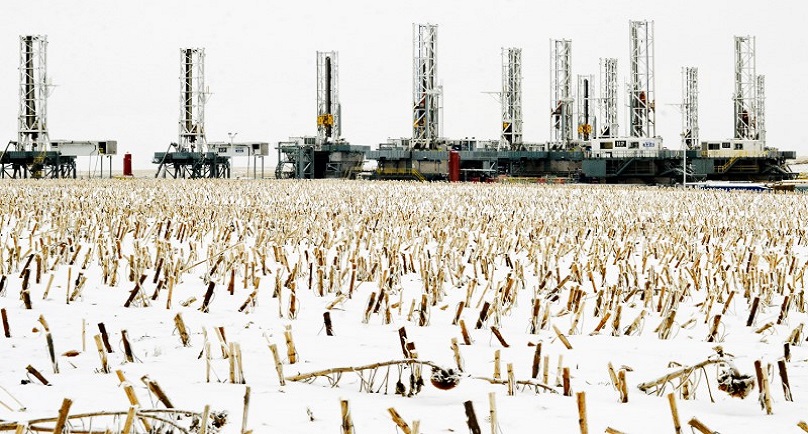Image: Sunflowers stalks punctuate the snow in a field near dormant oil drilling rigs which have been stacked in Dickinson, North Dakota January 21, 2016. REUTERS/Andrew Cullen
By John Kemp
LONDON (Reuters) – (John Kemp is a Reuters market analyst. The views expressed are his own)
Britain’s Labour Party adopted the song “Things can only get better” as its campaign anthem for the 1997 general election, expressing the party’s ambitions for governing after 18 years in the wilderness of opposition.
Global oil refiners struggling with enormous stocks of distillate fuel oil as a result of a warm winter and the slowdown in world trade may be tempted to share the same sentiment about the winding down of El Nino.
The strongest El Nino conditions since 1997, and one of the strongest since 1950, have contributed to an unusually mild winter in North America, slashing consumption of heating oil (http:https:https://tmsnrt.rs/1n1dFGh).
So far this winter, heating demand across the United States has been 17 percent below the long-term average, according to the National Oceanic and Atmospheric Administration (http:https:https://tmsnrt.rs/1n1dTgx).
Coupled with the slowdown in freight movements, lower heating demand has sent U.S. consumption of distillate fuel oil tumbling to its lowest level in more than a decade.
At the same time, U.S. refineries have been running at record rates to meet strong demand for gasoline from motorists, and producing large quantities of distillates in the process.
The result is that U.S. distillate stocks are about 48 million barrels, 43 percent higher than normal for the time of year, once lower consumption is taken into account (“U.S. refiners lose control of distillate stocks”, Reuters, Feb 2016).
Most distillate is used as diesel in trucks, locomotives and ships, as well as engine fuel for compressors, pumps and generators.
Only a small percentage is used as heating oil for homes and commercial buildings, mainly in the U.S. Northeast and Mid-Atlantic states(“State Profiles and Energy Estimates”, Table F7 Distillate Fuel Oil Consumption, EIA, 2015).
U.S. distillate consumption started to become sluggish in the second quarter of 2015, long before the winter heating season, about the same time the slowdown in freight movements became apparent (http:https:https://tmsnrt.rs/1n1dNpn).
But the warm winter turned a modest slowdown into a major problem for refiners by slashing seasonal distillate consumption in the final two months of 2015 and the start of 2016.
The result was an unusual slowdown in distillate consumption from mid-November and a corresponding rise in stockpiles.
The outlook for freight-related distillate demand, which accounts for most distillate consumption, is increasingly uncertain (http:https:https://tmsnrt.rs/1n1dQBu).
The global economic outlook has darkened and the risks of recession in the United States and elsewhere appear to have increased, which would be a major blow for refiners.
However, if the U.S. and global economies can avoid a recession, the weather should at least be more favourable for distillate consumption in 2016 than it was in 2015.
El Nino is only one of several atmospheric and oceanic circulations which influence winter weather patterns across the United States (“Warm winter ahead? Polar vortex says maybe not”, Reuters, Nov 2015).
But there is little doubt that it has a major background influence on winter temperatures, heating demand and distillate consumption.
The good news for refiners is that El Nino is a cyclical phenomenon (“El Nino 101: what everyone needs to know”, Reuters, Feb 2016).
The exceptionally strong El Nino conditions experienced in winter 2015/16 are unlikely to be repeated in winter 2016/17.
The current El Nino is already past its peak and beginning to fade, according to weekly observations published by NOAA (http:https:https://tmsnrt.rs/1n1dOcM).
Other things being equal, next winter should see higher heating demand across the United States and greater heating oil consumption.
The problem for U.S. refiners is the market will be carrying an enormous overhang of distillates from winter 2015/16 which will continue to depress margins.
And stocks will probably increase further over the summer as refiners maximise throughput to meet demand for gasoline during the driving season.
But at least the underlying market situation should not get any worse – unless the U.S. and global economies go into recession.
Things can only get better … surely?
(Editing by Susan Thomas)
Copyright 2015 Thomson Reuters. Click for Restrictions.


